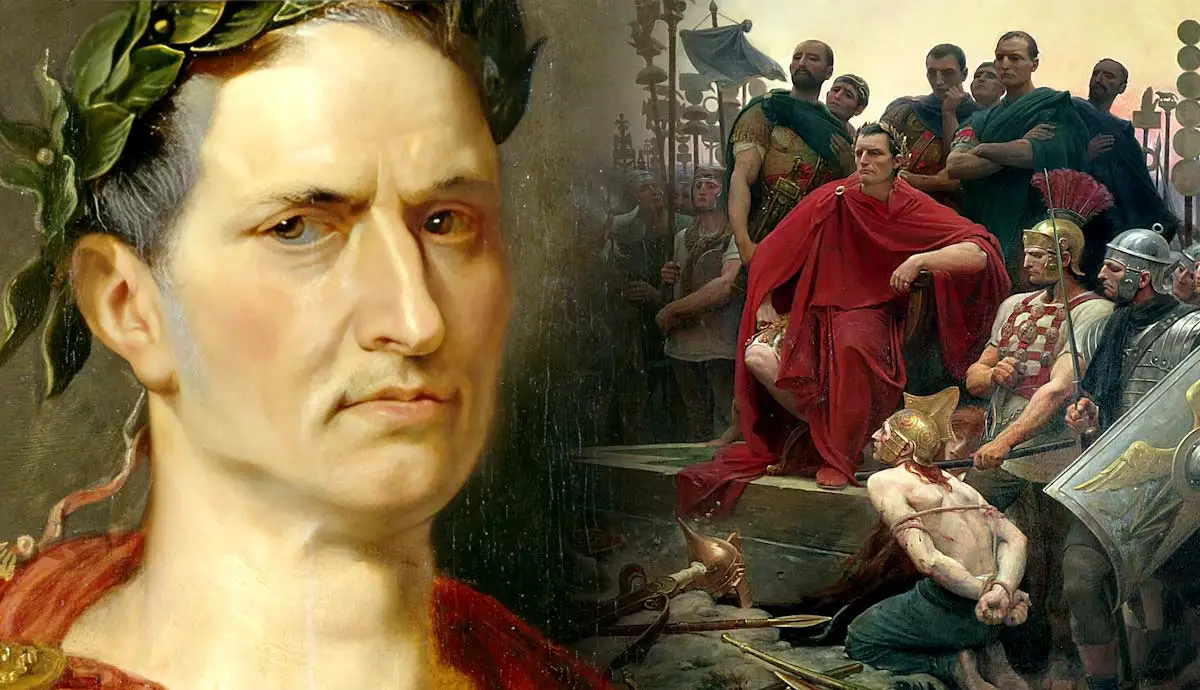Pareshe Fatima
Julius Caesar by William Shakespeare, a five-act play, stands out for its portrayal of the assassination of Julius Caesar, a formidable Roman leader, by a group of conspirators led by his friend Brutus. This historical tragedy delves into themes of betrayal, where loyalty is tested and friendships are shattered, ambition, where the hunger for power drives men to commit heinous acts, and the far-reaching consequences of political power, where the actions of a few can change the course of history. These themes offer a unique narrative that captivates readers and theater-goers alike.
Act I of Julius Caesar is a masterclass in building dramatic tension. It introduces the main characters and sets the stage for the plot. The tribunes of Rome, Marullus and Flavius, are suspicious of Caesar’s burgeoning power and popularity, leading to a tense confrontation with citizens eager to celebrate Caesar’s triumphant return from war. Caesar, warned by a stranger to beware the Ides of March, dismisses the warning, setting the stage for the unfolding tragedy. Fellow senators Caius Cassius and Marcus Brutus, harboring suspicions about Caesar’s ambitions, plot his assassination, setting in motion a chain of events that will shape the fate of Rome.
Act II of Julius Caesar delves into the emotional turmoil of Brutus as he is manipulated into joining the conspiracy against Caesar. The conspirators, employing deceit and persuasion, plant false documents and visit him at night to sway his allegiance. Brutus, torn between his loyalty to Caesar and his love for the Roman Republic, is deeply troubled but refuses to confide in his devoted wife, Portia. On 15 March, Caesar’s wife, Calpurnia, pleads with him not to go to the Senate, but he is swayed by flattery to go. There, he is stabbed by each conspirator in turn, including Brutus, who delivers the final blow, a poignant moment that underscores the depth of Brutus’ internal conflict.
Act III shows how Mark Antony, Caesar’s protégé, is allowed to speak a funeral oration for Caesar in the marketplace, but only after Brutus explains the conspirators’ reasons and their fears for Caesar’s ambition. Antony questions the motives of the conspirators and reminds the crowd of Caesar’s benevolent actions and his refusal to accept the crown. He also reads them Caesar’s will, in which Caesar leaves public land and money to each Roman citizen. Antony’s speech stirs the crowd into a murderous riot, and the conspirators are forced to flee from the city.
Act IV shows how Brutus and Cassius gather an army in Northern Greece and prepare to fight the forces led by Mark Antony. They make amends and prepare to engage Antony’s army at Philippi despite Cassius’ misgivings about the site. Brutus stoically receives news of his wife’s suicide in Rome. He then sees Caesar’s ghost as he tries to rest, but he is unable to sleep on the eve of the conflict.
Act V shows how the battle seems to be going in favour of the Republicans, but when Cassius’ messenger’s horse seems to be overtaken by the enemy, Cassius fears the worst and gets his servant to help him to a quick death. After finding Cassius’s body, Brutus commits suicide. Antony is triumphant on the battlefield, praises Brutus as ‘the noblest Roman of them all,’ and orders a formal funeral before he and Octavius return to rule in Rome.
Shakespeare’s portrayal of the characters in Julius Caesar is masterful. Each character is complex and multi-dimensional, making the plot more interesting and engaging. Brutus, for instance, is portrayed as a man of principle who is torn between his loyalty to Caesar and his love for the Roman Republic. Cassius, on the other hand, is depicted as a jealous and scheming man who is envious of Caesar’s power. Mark Antony, a loyal friend of Caesar, is portrayed as a man seeking revenge on his behalf, but also as a shrewd politician. These characterizations add depth to the plot and provide a nuanced understanding of their actions.
The language in Julius Caesar is not just poetic, but a rich tapestry of words that weaves a masterpiece of English literature. The play is adorned with memorable quotes, such as the haunting ‘Et tu, Brute?’ and the introspective ‘The fault, dear Brutus, is not in our stars, but in ourselves.’ The plot, with its twists and turns, is a journey that keeps the audience spellbound until the very end, a testament to the power of Shakespeare’s language.
Julius Caesar is not just a timeless classic, but a mirror that reflects the universal themes of betrayal, ambition, and political power that are as relevant today as they were in ancient Rome. It continues to captivate audiences and inspire new generations of readers and theatre-goers, offering a powerful drama that resonates with the political and social realities of our time. The play, with its insights into the human condition, provides a profound understanding of our world, making it a must-read for all.
Please, subscribe to the YouTube channel of republicpolicy.com

















